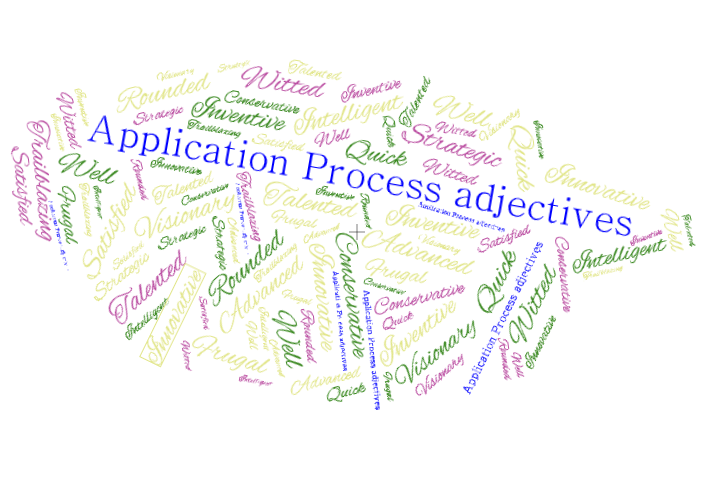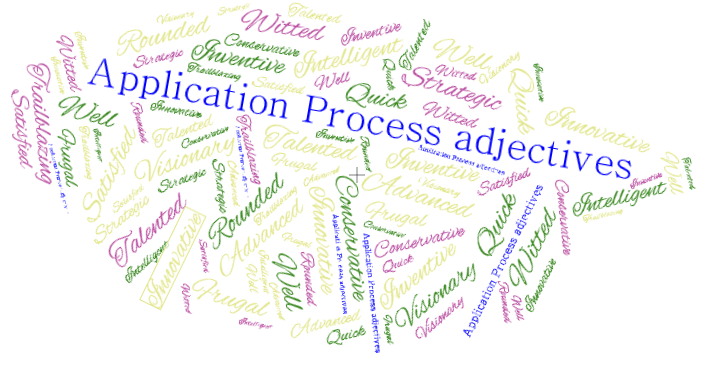There are empty phrases that you can find in almost every application. HR managers react accordingly in a bored manner. In order to stand out from the crowd, you should therefore become a little more individual and creative – but please not too much, because with these 13 adjectives you will shoot yourself out of the way in the application process.

Applicants love adjectives – HR managers don’t!
Adjectives are these “beautiful”, “small” adjectives that are used to describe a noun in more detail. Applicants like to use these “practical” helpers to individualize their cover letters a little. Did you notice how often adjectives can appear in just two sentences? It is not uncommon for HR managers to read sentences such as in the application documents
“I have a high level of commitment, modern know-how, and exceptional flexibility.”
Unfortunately, it is precisely with such empty phrases that applicants make a big mistake. Because in the end, the sentence sounds exactly like this: like an empty phrase. The formulation, however, would be much more convincing and professional:
“I have commitment, know-how and flexibility.”
It may be a little creative, but a very illustrative example: The use of adjectives quickly becomes unprofessional and thus has exactly the opposite of your actual goal, “convincing” in cover letters and job interviews.
13 words that you should avoid in the application process
In fact, many HR professionals are sensitive to adjectives. You should therefore avoid the following 13 words in the application process.
1. Innovative
The word “innovation” sounds nice and professional, do you think? So do you include it in your cover letter? Unfortunately, in the form of an adjective, it has little meaning and instead looks like you don’t know the real meaning of the word. Things are actually more innovative than people. Instead of describing yourself as “innovative”, you can, for example, write that you have initiative and always think along with you in your job or make suggestions for improvement.
2. Inventive
This synonym for the adjective “innovative” is also unsuitable for an application. Inventive sounds like a crazy “Einstein guy” who doesn’t really know what else to write in his application. In addition, this adjective exudes a touch of “lateral thinker” – and unfortunately not all companies or positions welcome them. If anything, you should therefore only use the word “inventive” when you are applying for a very creative position.
3. Well rounded
Do you have “well-rounded” knowledge in your specialist area? Not only does that sound strange, it also sounds pretty boring. Most HR professionals are not looking for an all-rounder in application processes and it is unrealistic for a candidate to have knowledge in all areas anyway.
In your application letter or interview, you should therefore focus on your expertise and describe the areas in which you are particularly well versed. So be convinced with a unique selling point instead of a well-rounded but less spectacular overall picture. The decision-makers also know that any knowledge gaps with sufficient motivation can be closed very quickly via “learning by doing”.
4. Talented
Of course, your gaps or weaknesses should not be an issue in the cover letter. However, they are often discussed in the interview. However, it won’t help you much if you argue, for example, that you are talented and that you would therefore learn extremely quickly. That sounds not only desperate but also a little arrogant. In the end, the HR manager has to find out for himself whether you are talented or not.
When it comes to this, let actions speak rather than words. Instead, focus on your motivation in the application process, because if you were not motivated, any talent would be out of place anyway.
5. Quick-witted
For many people, quick-wittedness is a desirable trait. In an application, however, the adjective is anything but good. If you describe yourself as “quick-witted”, it screams for a high willingness to conflict and a possibly rough or inappropriate tone. HR managers are of course interested in creating harmony in the team and selecting applicants with little potential for conflict accordingly. A better choice in the cover letter would be keywords such as “teamwork” or “empathic”.
6. Visionary
Do you describe yourself as a “visionary”? This adjective is unusual in German usage and therefore sounds more disturbing than positive. The HR manager will wonder what you want to express with this phrase. Perhaps you can call yourself a “visionary” like Steve Jobs if you have had a steep managerial career behind you and built up or successfully led many companies. Then you would certainly not have to write an application and use the adjective “visionary” to label yourself. In the end, it seems arrogant on the one hand and not very meaningful on the other. So rather define what exactly is so “visionary” about you and leave out such meaningless adjectives.
Read also: Applicant Screenings: What Can The Background Check Do?
7. Intelligent
are you intelligent? Who wouldn’t say that about themselves? There is probably no applicant who calls himself “stupid” in the cover letter or the interview. With a little knowledge of people and work experience, the recruiter can most likely conclude from your application or interview whether you are intelligent or not.
To call yourself intelligent therefore only makes sense if you are exceptionally intelligent and can prove this IQ accordingly. But hand on heart: In which jobs is high intelligence really the decisive decision criterion? Ultimately, in most professions, other skills, such as emotional intelligence, are more important.
8. Advanced
Do you have “advanced knowledge” or even describe yourself as “advanced”? What is that supposed to mean? Whether you are a young professional or not and what experience you already have can be seen by the HR manager from your resume. Accordingly, this adjective is not very meaningful and sounds more like you don’t have any better arguments for why you are the right candidate for the advertised position.
Being advanced also says little about your personality. Rather choose more individual formulations that you as a person make more tangible for the HR manager, for example, “patient”, “willing to learn” or “capable of criticism”.
9. Conservative
The fact that you are conservative is information that is uninteresting and possibly even confusing for the HR manager. Your attitude to life is basically your private matter and whether you are conservative, traditional, modern, or hedonistic is just as relevant for the decision-makers as your piety or your style of clothing – namely not at all. In the end, it’s just a matter of presenting yourself correctly in your professional life, for example with regard to your clothing, and that you fit in with the company.
Even if it is a conservative company, you will not increase your chances with the adjective “conservative” in your cover letter or job interview. After all, it says nothing about your hard and soft skills or other strengths.
10. Frugal
The fact that you are a frugal person is of little interest to the HR manager. This information is only relevant if you were responsible for the company’s finances and your frugality would benefit it accordingly. Otherwise, you should leave such “private” information out of the picture. After all, you have to be brief in your cover letter. Use the limited space for adjectives that describe your personality or your strengths.
11. Strategic
That you call yourself strategic sound professional, but what does that mean? Your way of working can be strategic or you achieve your goals strategically, but as a person, you probably meant “determined” or “organized”. Make sure that the adjectives you choose in the cover letter or interview express exactly what you want to say. This is the only way to avoid misunderstandings, which in the worst case could mean the end of the application process.
12. Satisfied
Anyone who calls themselves satisfied should get a frown from the HR manager. If you’ve been so happy in your previous job, why would you want to change your job? Even as a career starter, it remains to be seen whether or not you would be satisfied with your new position. Of course, the employer wants satisfied, happy, and healthy employees. However, satisfaction is a temporary state because life always consists of ups and downs, so this adjective does not describe your personality and is therefore not very meaningful.
13. Trailblazing
To call oneself “trailblazing” is evidence of considerable self-overestimation and the HR managers can certainly do without another narcissist in the company. If you were a pioneering personality, you would probably not have to write an application, as with the adjective “# 6 visionary”, but the headhunter or HR manager would have approached you of their own accord. You can of course write that you held a management position in the previous company, but to call yourself a role model or “pioneering” is clearly too much of a good thing.
Which adjectives should you choose for your application?
As you can see, there are adjectives that are not very meaningful, that seem arrogant, or that you should only use to describe other people, but not yourself. Be careful when using adjectives in the application process. Sometimes less is more and this credo also applies to your cover letter and interview: Avoid adjectives as much as possible.
If you still want to use a few, choose meaningful words that you make tangible as a personality for the recruiter. Describe your strengths, and hard and soft skills in an understandable and detailed manner and only name information that is relevant to the advertised position. Suitable adjectives are, for example:
- enthusiastic
- assertive
- ambitious
- flexible
- patient
- sociable
- creative
- ready to learn
- motivated
- dutiful
- punctual
- self-assured
- self-employed
- team player
- responsible
- determined
Of course, you have to choose the adjectives that apply to you. This is the only way you can turn your inconspicuousness into an individual application without empty phrases, which the HR managers can use to get to know and assess you optimally during the application process. As already mentioned, it can seem all the more convincing and self-confident to use few or no adjectives and instead let your résumé, certificates, and personality speak for themselves.
What do you think? Are you more of a fan of adjectives or not? And why? Which adjectives do you think are suitable for the cover letter or interview and which are not? We look forward to your additions in the comments!















































